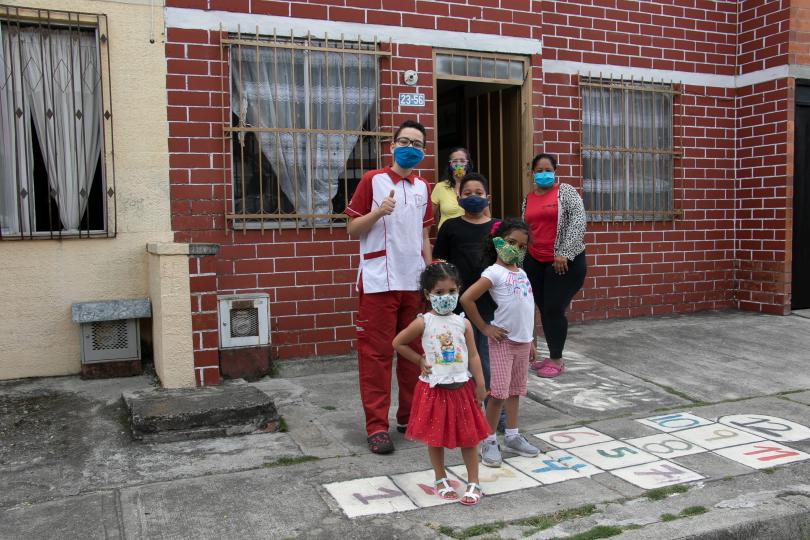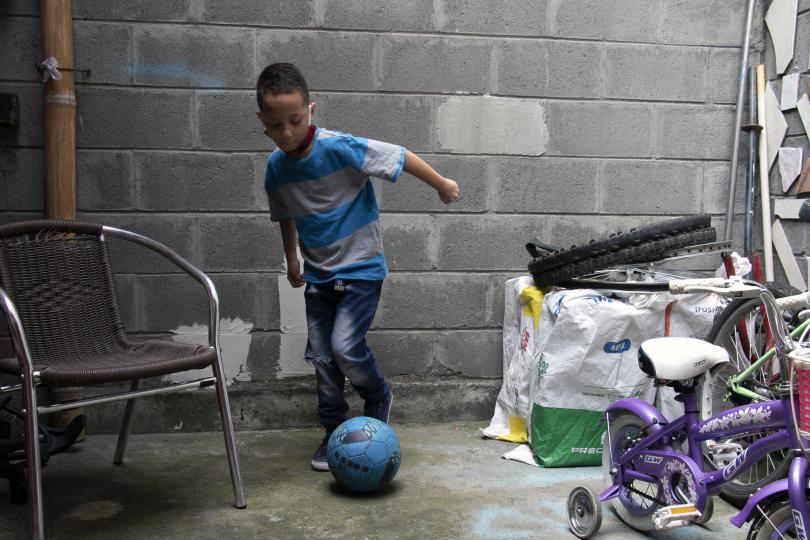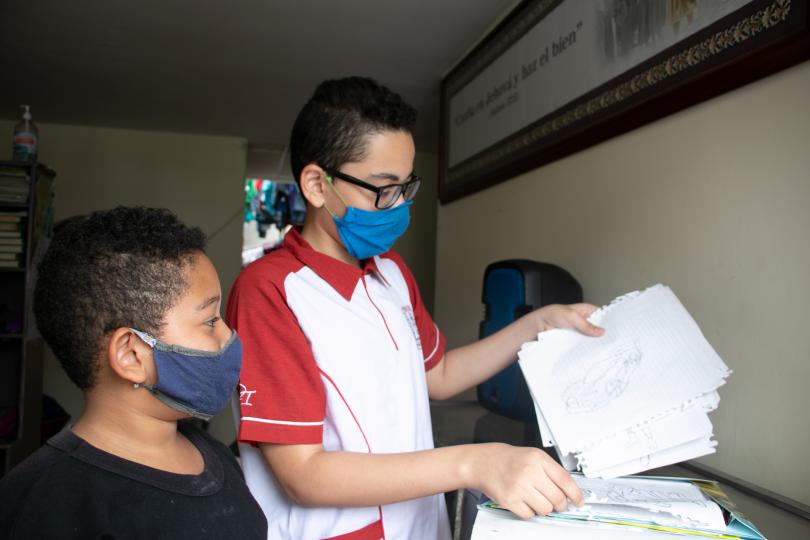“THIS IS NOT THE SAME:” A global pandemic through the eyes of migrant children

Leaving everything behind and migrating to an unfamiliar country is never easy, but the COVID-19 pandemic has made the lives of migrant children and their families all around the word even more difficult. Daniel* (12) and Adrian* (7) - both from Venezuela - live with their families in a small town in Colombia, just outside of Valle del Cauca Department’s capital city of Cali. Today, on International Migrants Day, they share their stories with us.
LIFE IN VENEZUELA
DANIEL: My life before was normal. I spent most of the day at school. Sometimes, when my mom let me, I would go to some friends' houses to play, but I had to do my homework first.
ADRIAN: I like Venezuela. My dad would take me to school…sometimes he would take me to the beach. It was very cool. My house was green and blue, but inside it was gray.
DANIEL: But when the situation changed, it was a little more difficult. At that time, food was very expensive. It was very difficult to obtain money and it was also hard to buy food.
ADRIAN: It was expensive to buy food. That is why [my family] decided to come here.
THE JOURNEY TO COLOMBIA
Ultimately, the difficult situation back home in Venezuela drove Adrian's and Daniel’s families to make the long, arduous journey to Colombia. The boys remember having mixed feelings during the trip.
DANIEL: The trip was long, and I hardly slept. On the trip I was happy, seeing everything through the window was beautiful. I wondered we were going. I wondered what was ahead, what I could not see.
ADRIAN: I remember that we had to take two buses: one to get to Bogotá and the other to go to my aunt's house. During the trip I felt sad, because there is no going back.

LIFE BEFORE AND AFTER COVID-19
Both Daniel and Adrian had a hard time settling into their new lives at first. Daniel shares that he felt a little bit confused on his first day at his new school, noting that it was a little bit hard to make new friends. After a while, both boys grew to enjoy their new homes in Colombia. Then, with the arrival of the COVID-19 pandemic, everything changed.
ADRIAN: My life here [in Colombia] is very beautiful and I like it, but [it was better] when there was no coronavirus.
DANIEL: Before [the pandemic], it was very nice to play with your friends and see that they played with you. After a while, the teacher would take us out to play [during recess]. We liked to play freeze tag.
ADRIAN: Before, I played during recess, but I also had a lot of fun learning things at school. I played soccer. I had a lot of fun… but not in this quarantine.
Among the most difficult adjustments for Adrian and Daniel has been the impact the pandemic – and the measures taken to contain it – on their education. Unable to attend classes in person, they have found it difficult to keep up with their schooling from home.
ADRIAN: It is very different now. Before, I would sit next to my classmates, and I would take out my pencil and start writing. Now, it is very different, because the chalkboard was bigger than the computer. Even the students in the back of the room could see it. This is not the same.
DANIEL: Now, I longer go to classes. I feel that I learned more going to school because each teacher had their own time, and it was for six hours. Now in virtual learning, either it is independent study, or they give very few hours a day, like two hours.
The shift from in-person classes to virtual learning has been tough for Adrian and Daniel, who have difficulty accessing and completing their assignments due to poor internet connection at home. They also miss the comradery that comes with learning alongside their friends in the classroom and playing soccer at recess.
DANIEL: In the beginning, I did not have internet, and it was difficult for me to do my tasks. Thanks to some neighbors they let us borrow their Wi-Fi, but we could only quickly to download the assignments. Watching videos is much more difficult for us.
ADRIAN: We cannot do anything anymore. I miss my classmates, my soccer team, and my coach. But we have to be grateful, because now we have food.
DANIEL: Not going back to school, it feels like something nostalgic. It is sad, because you feel like you won't see your friends again.
ADRIAN: I’m going to believe that I'm going to go to school again. The future can give you ‘unexpected’ surprises. You never know, right?

LOOKING AHEAD: HOPE FOR THE FUTURE
Although they still feel worried sometimes, both Adrian and Daniel hold onto the hope that things will return to normal someday and look for ways to remain positive.
DANIEL: When they come out with a medicine that kills the coronavirus, I have a feeling that this will improve. But sometimes, I worry that when the medicine comes out, we will have to pay too high prices to get it.
Knowing that there are many children all around the world who are going through the same thing makes them feel a little bit less alone. Both boys shared some advice for children like them who are having a difficult time coping with COVID-19.
DANIEL: [They should not] lie in bed sad all the time thinking about what they are going to do when they can go out again. Focus on where they are now and make time to do fun things as a family.
ADRIAN: I’d tell them not to worry, and that everything is going to change. To my mom, too. She sometimes gets sad for her family and sometimes I tell her, “Mommy, don't cry because soon all of this will pass.”

Overcoming all the challenges brought on by the COVID-19 pandemic is a difficult task for anyone, but migrant children – like Adrian and Daniel – face some specific concerns. They worry about not being able to access health care or enroll in school. They wonder whether their families will be able to find stable employment in their new countries and earn enough money to put food on the table. They fear that they’ll be sent back home to the even more difficult struggles they left behind. Despite all of this, they do everything they can to remain resilient and hopeful.
DANIEL: Moving to another country is not simply losing everything. [Migrants] have to keep moving forward, they must adapt to where they are. And honestly, we always have to find a solution to the problems we have.
On this International Migrants’ Day, Save the Children stands with Adrian, Daniel, and all migrant children and their families who have had to leave everything behind in search of a better life, in Latin America and the Caribbean and beyond. We remain committed to working with governments and decision-makers, alongside our civil society partners, to ensure that migrant children’s needs and rights are protected and defended and provide every last child – no matter their country of origin or migration status – with the assistance and opportunities they need to survive and thrive.




